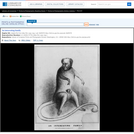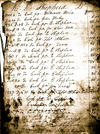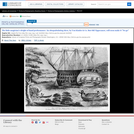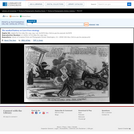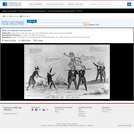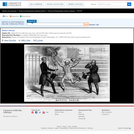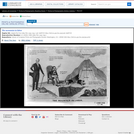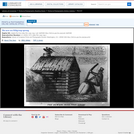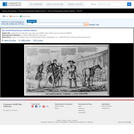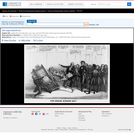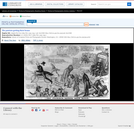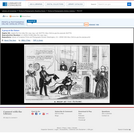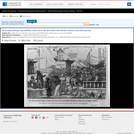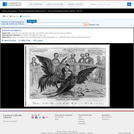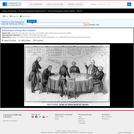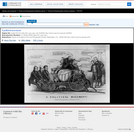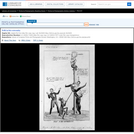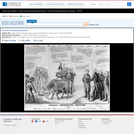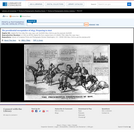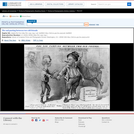A satirical view of the scramble among newly elected President James K. Polk's 1844 campaign supporters, or "patriots," for "their beans," i.e., patronage and other official favors. Polk (upper right) sits in the Presidential Chair, his hands folded and apparently oblivious to the activity around him. From behind the chair Andrew Jackson prompts him, "That's right Jemmy, Non Committal. By the Eternal you're a chip of the old block." To Polk's right a group of homely women present a petition and ask, "Can't you do something for us? we are poor weak women in great danger of being seduced! We want a proclamation in behalf of our Moral Reform Society." Below him John Beauchamp Jones and Francis Preston Blair, editors of influential rival newspapers, the "Madisonian" and the "Globe," fight for the privilege of being the administration organ. In the center an Irishman, hat in hand, approaches Polk and asks, "Plaze yer honor's worship, can't ye do somethin' for me? I was bor-r-n in Boston and rared in New-Yor-r-k, be the howly St. Patrick, and nivver a bit of an office have I had yet." Nearby, a German or Dutchman walks away in disgust shouting, "Dod rot this administration! I've lost my sittivation that Tyler give me, that was worth $15 a year! Dod rot 'em, I say!" In the foreground Secretary of State James Buchanan asks a small, ragged figure, "What Office do you expect, my man?" The man, a Rhode Islander, responds, " . . . I was an Officer with Govr. Dorr, and I should like to be an Officer agin; but I ain't perticklar, if you haint got no office may be you've got some old Clothes to give me!" Dorr was the leader of an abortive revolution in Rhode Island in 1842. (See Trouble in the Spartan Ranks, no. 1843-6). At left South Carolinian John C. Calhoun, a frustrated aspirant for the 1844 Democratic nomination, rides off on a velocipede saying, "Let this Poke manage two stools if he can, I'll cut my stick, and be off for the sunny south." Above, in the background, members of the "Empire Club" wave their hats and fire a cannon. They may represent the expansionist platform on which Polk campaigned, which many Whigs feared would provoke war with Mexico. In the left foreground is a motley militia troop carrying a banner "For Oregon!! Liberty! or Death!!!" Their leader proclaims, "Follow me brave soldiers, strike but one blow, and Oregon is ours!" Polk's campaign platform favored reannexation of the Oregon Territory.|Entered . . . 1845 by J. Baillie. |Lith. & pub. by James Baillie 118 Nassau St. N.Y.|Probably drawn by Edward Williams Clay.|The Library's impression was deposited for copyright on March 24, 1845.|Title appears as it is written on the item.|Weitenkampf, p. 85|Forms part of: American cartoon print filing series (Library of Congress)|Published in: American political prints, 1766-1876 / Bernard F. Reilly. Boston : G.K. Hall, 1991, entry 1845-3.
